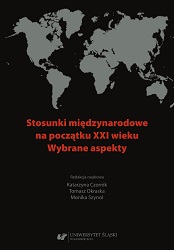Kierunki gruzińskiej polityki zagranicznej po wojnie rosyjsko-gruzińskiej w 2008 r.
Directions of Georgian foreign policy after the Russo-Georgian war in 2008
Author(s): Sylwia Demedziuk
Subject(s): Politics / Political Sciences, Political Sciences
Published by: Wydawnictwo Uniwersytetu Śląskiego
Keywords: foreign policy; Russo-Georgian War; security
Summary/Abstract: In his article, the author will focus on the analysis of Georgian foreign policy after the war in 2008. Especially on relations with NATO and the European Union. What will offer the background for the article will be the situation in Georgia since 1991, i.e. the moment when the country gained its independence.An analysis of the current literature on the subject allows us to draw the conclusion that thepresented pro-Western tendencies are certainly a result of many interrelated factors. Georgia is currently struggling with numerous problems, inter alia, high unemployment, weak currency and poor territorial integrity. In recent months, Georgian politics seems to have turned away from the Euro-Atlantic idea because of the lack of faith in the real possibility of joining the Alliance in the years ahead. On the other hand, the relations between Georgia and the European Union are strengthening, which confirms, for example, the signing of the 2014 Association Agreement. At present, the ruling political group in Georgia – the Georgian Dream – is also striving to warm relations with the Russian Federation. The paper will be based on the research carried out by the aforementioned experts and the author’s own studies.
Book: Stosunki międzynarodowe na początku XXI wieku. Wybrane aspekty
- Page Range: 181-197
- Page Count: 17
- Publication Year: 2017
- Language: Polish
- Content File-PDF

